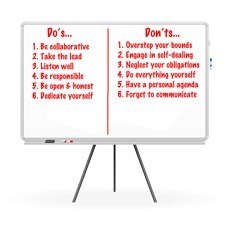
It only takes a few minutes of a web search to uncover the traits that make a successful person or business owner. For example, Entrepreneur magazine’s Steven Key wrote the article, “5 Qualities of Successful Persons,” which included such traits as open-mindedness, unwavering passion, and a forward-looking approach. But what makes a board of trustees, which is made up of individuals volunteering their time, a successful one?
Be Collaborative
Helen Keller once said, “Alone we can do so little; together we can do so much.”
The definition of collaboration is the act of working with another or others on a joint project. “Members of an effective and successful board are all on the same page,” says Dale Young, director of portfolio management at FirstService Residential, one of the largest property management companies in the country. “They are seeking improvements and infrastructure that is in the best interest of the community. In a successful board there are no personal agendas. The board should be serving in the best interest of the association as a whole.”
Listen Well
“Most people do not listen with the intent to understand; they listen with the intent to reply.”—Stephen R. Covey, The 7 Habits of Highly Effective People: Powerful Lessons in Personal Change.
When you ask attorneys who might make the best board member, a lot of answers are not surprising: former accountants, business executives, engineers. But, Scott Sandler, an attorney at the law firm of Perlstein, Sandler & McCracken, LLC, in Farmington, Connecticut, had a new one: kindergarten teachers. “They understand how to deal with chaos, people with short fuses, differing personalities,” says Sandler. “They know who needs their hand held, who needs to be provided with challenges of how to motivate people. In one sense, teachers have proven to be decent board members.” Mostly, Sandler says, it’s more about set skill sets that come in handy for board members. “Folks that are just used to having to move a lot of components into one direction. Like an air traffic controller, where you have all these moving parts, and it’s your job to see a pattern and move them all so they’re going in the right direction.”
Other backgrounds can prove to be compelling when applied to a condo board. “I had a board member who was good at accomplishing tasks, but also rubbed people the wrong way sometimes: he was a union leader. He was used to standing and sometimes being a target, pasting that target on his chest, but at the same time, organizing people, getting them to support a common goal,” says Sandler.
Be Responsible
Actor and professional wrestler Dwayne “The Rock” Johnson had it right when he said, “Know your role.”
All board members should know their role and what’s expected of them. The simplest way to getting there is understanding the whole concept of the fiduciary responsibility of the board of trustees to the entire building. In a nutshell, the board is a governing body that makes decisions that aren’t going to be popular, but they are responsible for the entire well-being of the building and the unit owners who reside in them.
Whatever experience board members come with, they certainly cannot act simply on behalf of themselves. It’s also vital that board members listen to each other and to the unit owners.“Board members have to understand that they’re one of several board members. Listen to everyone and then make a decision. Don’t prejudge what you’re going to do, because other board members might have good ideas, but they’re not listened to,” says Richard Brooks, an attorney and partner at the law firm of Marcus, Errico Emmer & Brooks, P.C., in Braintree, Massachusetts. “Often It’s also vital that board members listen to each other and to the unit owners.times, the best trustees are people who don’t get on with an agenda that only concerns them, that’s the worst kind of board member,” he says.
A major sign of maturity among board members pertains to that they don’t talk unless they absolutely need to. “You don’t always have to say something at a board meeting. You can just vote on something. A lot of board members feel like they have to add their opinion or gossip. They should to leave out personalities when they’re making decisions,” says Brooks. Keeping comments infrequent and concise keeps things professional and brief,” he says.
Be More Forward-Thinking
Life is what happens to you while you're busy making other plans.” —Allen Saunders.
Allen Saunders’ quote might sound like a new-age way of thinking, but the reality is that while you’re planning for today, tomorrow is coming fast, so it’s important to have a board that thinks about the ‘what-ifs,’ even when nobody wants to. As a matter of fact, thinking about tomorrow is one of the most important things a board of trustees can do for the success of the property.
Successful boards are also those who look, not just at today’s issues, at tomorrow as well.
Dedicate Yourself
“We all have dreams. But in order to make dreams come into reality, it takes an awful lot of determination, dedication, self-discipline, and effort.”—Jesse Owens
The most successful ones have members who stay on the board for more than just a year or two. Property managers and attorneys have found that the most important aspect of a successful board is that they don’t change every year. That said, no changeover at all can be detrimental as well. If there’s no change in leadership, transparency tends to fade away, and few new ideas are brought to the table.
Learn to Communicate
“The single biggest problem in communication is the illusion that it has taken place,” says George Bernard Shaw.
Aside from using the resources and professionals given to you, the most important trait for a board member/trustee is to be open and transparent to other unit owners. “The biggest complaint owners have is lack of communication. Often it’s not that they’re not communicating, it’s that owners aren’t listening. The best thing boards can do is to communicate as much as they can with an email, or website. If the owners know what’s going on, there’s a lot less unrest in the community,” says Brooks.
As with any institution, politics do play a role in condo boards and buildings, and while unnecessary posturing is usually a big mistake, smart boards utilize their professional help to make sure unit owners don’t have aggressive knee-jerk reactions to regrettable news. “It’s unfortunate, but it’s beneficial for me. Frequently board members will ask their manager a question, and get what is a perfectly correct answer, but they don’t trust the answer until they’ve paid an attorney to confirm it,” says Sandler.
The best boards, says Richard Stern, president of Sutton Management in North Andover, Massachusetts, “certainly have the ability to work together and listen. Boards are a lot like the government. They have to be able to express their opinions but at the end of the day they have to come together with a common goal for the good of everyone.”
Boards should know how unit owners respond to certain figureheads, so unit owners don’t overreact in tense situations. “I’ve seen managers stand up in front in a room full of unit owners, try to explain the ins and outs of a situation, and unit owners don’t necessarily buy into because, the manager is just an agent of the board. But when an attorney stands up in front of a room with a shirt and tie, suddenly there’s a sense of authority that goes along with the statement. Managers are not lawyers, and they shouldn’t try to be, but it’s interesting how the perception is to view them as the evil agents of the board,” says Sandler.
Be Respectful of Other Opinions
The famed comedian Rodney Dangerfield made it his mantra that he gets no respect, but the last thing you want is for board members and unit owners to feel that way.
“Don’t make it personal. Don’t gossip about it. Take in the information. Don’t speak on behalf of the board until the board’s decided on something, unless you’re appointed to deal with certain issues,” says Brooks.
Communicate, says Stern. “Listening to the community, members of the association,” is vital, he says. “Condo board members are privy to a lot of information that unit owners aren’t. They have to translate that to the rest of the association. They have to have thick skins and take criticism when they’re serving on the board. They have to be able to take criticism, and like anything, people are going to criticize their decisions. One of their important roles is to bring everyone together, and you’re going to have outliers. You have to be able to taken an unpleasant assessment, and explain to everyone that’s necessary and the association needs it. They have to leave their personal agendas at home. Open up to what the community needs, and check their egos at the door. They need to be able to give credit to other people.”
Be Open and Honest
“It is better to offer no excuse than a bad one,”—George Washington.
A good rule of thumb is to simply share as much information as possible with the owners. An open board is perceived as an honest and fair board, especially when it comes to financials and contracts. “No board member ever got in trouble for giving the community more information than it demanded. The more you can do to inform the unit owners the better. If you’re providing the information, and they know it’s accessible, they have a sense of security,” says Sandler. “If you’re giving them this information, and trying to get their input, then on the one hand you may get one more information in assisting your decision. You might talk to unit owners and find that they support a reserve study. When you’re not sharing the information, even though you’re not intentionally hiding the information, it’ll be assumed that you are. The more you stonewall unit owners when they ask questions or ask for information, people will assume that you’re hiding something. Always provide more information than the owners expect,” he says.
Watch Carefully
On the flip side, some boards struggle and succumb to pitfalls. “Political in-fighting can cause a board to be completely ineffective,” says Young. “You will never accomplish association business when members are fighting each other instead of figuring out how to work with each other. Respect one another’s opinions, even if from another vantage.”
“My best board member happened to be a real estate broker. He listened to everything we said, always remembered everything he said. It was amazing. He wouldn’t call and ask a question the second time, because he remembered what to do from the first time,” says Brooks.
By studying and implementing these traits, the board has a greater chance of success and longevity, without serious problems.
Lisa Iannucci is a freelance writer and a frequent contributor to New England Condominium. Editorial Assistant Tom Lisi contributed to this article.






Leave a Comment